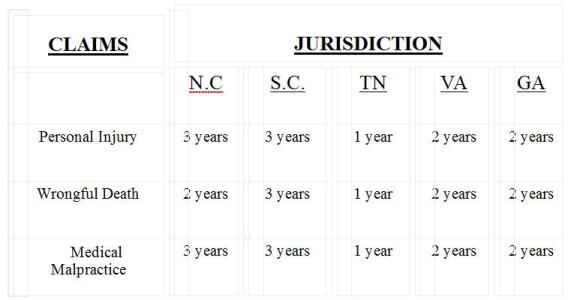Where Did You Say The Accident Happened?
Out Of State Statutes Of Limitations Continue To Vex LML Insureds
Every year Lawyers Mutual receives numerous claims resulting from a missed statute of limitations on a personal injury claim where the accident occurred out of state. Most of the states surrounding North Carolina have shorter statutes of limitations for personal injury actions than we do, and those statutes will control if you have to file the case in the other jurisdiction. (See chart below). The typical malpractice trap occurs when a resident of North Carolina is injured in a car accident in another state and hires a North Carolina attorney to negotiate a settlement with the tortfeasor’s insurance carrier. Failing to notice that the accident occurred out of state and that the tortfeasor was not a resident of North Carolina, the lawyer and his office just handle the case like a normal personal injury case with a three year statute of limitations. The lawyer does not become aware of the missed out of state statute of limitations until tortfeasor’s insurer denies the claim after receiving the settlement package or the lawyer is finally forced to draft a complaint and realizes that he is going to have to sue the tortfeasor in the state where the accident occurred. The trap is sprung and the attorney then calls Lawyers Mutual in panic, embarrassment, or anguish.
If you choose to undertake a representation for an accident that occurred in another state, your office should have procedures in place specifically aimed at alerting the lawyer and staff that the claim may be subject to an out of state statute of limitations. Your Personal Injury Client Intake Form must have prompts that elicit the state where the accident occurred, the identity and residence of the tortfeasor, the jurisdiction where the complaint would need to be filed if necessary, and the statute of limitations that will apply to the claim. Regardless of who does the initial client interview and intake form, the attorney who has ultimate responsibility for filing a complaint should review the gathered information and make an immediate determination of the proper statute of limitations that is then properly docketed. Our Client Intake Handout on Lawyers Mutual’s website has an example of such an initial Interview Form for a personal injury claim.
If the attorney has any question at all about the correct out of state statute of limitations, the attorney should request an opinion letter from an attorney in that state as to the applicable limitation period. This is advisable for most such claims because the foreign jurisdiction may have obscure, hard-to-find statutes of limitations that apply to the specific facts of your case. By getting such an opinion letter, you will have discharged your due diligence requirement and will be able to shift responsibility to someone else if an error is made. You should expect to pay for the attorney’s services. If the claim does not warrant the payment of a fee for receiving this advice, the claim is not worth pursuing.
If you believe that you have missed an out of state statute of limitations, please call us immediately to see if there is a potential claims repair. For instance, it is sometimes possible to use North Carolina’s longer statute of limitation if you are able to establish that the defendant has sufficient minimum contacts in North Carolina to obtain personal jurisdiction over the defendant here. Byrd Motor Lines, Inc. v. Dunlop Tire and Rubber Corp., 63 N.C. App. 292, 304 S.E.2d 773 (1983) (Statute of limitations of the forum state applies to cause of action). Your personal injury action may also be rescued by the Service Members’ Civil Relief Act, which tolls any statute of limitations from running at all while either the plaintiff or defendant are on active military duty. Beaver v. Fountain, ___ N.C. App. ___, 701 S.E.2d 384 (2010).
Check out the "Be Wary When Stepping Outside of Jurisdiction or Expertise" article on our blog, A Byte of Prevention, for additional safety tips. Subscribe to our blog for more tips for a safe and effective practice.

Warren Savage joined Lawyers Mutual as claims counsel in 2005. He focuses on litigation, criminal defense, appellate advocacy, and professional responsibility in his work with Lawyers Mutual. A former partner with the law firm of Bailey & Dixon in Raleigh, Warren graduated from the University of Virginia and earned a Master of Arts in Teaching at the University of North Carolina at Chapel Hill before graduating magna cum laude from Campbell University School of Law. He spent several years as a high school English teacher. Contact Warren at 800.662.8843 or wsavage@lawyersmutualnc.com.
About the Author

Warren Savage
Warren Savage is a claims attorney with Lawyers Mutual. Warren spends his days counseling lawyers on litigation and appellate practice issues and advising on practice management and ethics conundrums. Contact Warren at 800.662.8843 or warren@lawyersmutualnc.com.
Read More by Warren >
